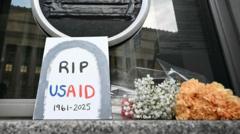The suspension of funds from the US Agency for International Development (USAID) poses serious risks to global health efforts, according to experts who highlight potential consequences like the spread of disease and disruption of crucial healthcare services.
Global Health Experts Express Alarm Over US Aid Suspension

Global Health Experts Express Alarm Over US Aid Suspension
A freeze on overseas aid by the US raises concerns about its impact on global health initiatives, particularly in disease control and healthcare services.
The global health community is expressing deep concerns following the announcement by the Trump administration to suspend about $1 billion in overseas aid from the United States Agency for International Development (USAID). This agency is pivotal in providing health services and funding programs aimed at combating diseases worldwide.
Under the new "America First" policy, the US government has temporarily frozen aid funding for 90 days while officials evaluate how it aligns with national interests. Critics, particularly health professionals, fear that these cuts could have devastating effects on the fight against infectious diseases, as well as hinder research and treatment advancements.
Dr. Tom Wingfield from the Liverpool School of Tropical Medicine emphasized USAID's role in addressing public health issues such as under-nutrition, hygiene, and access to clean water, all of which are crucial for preventing diseases like tuberculosis (TB). With TB alone claiming 1.3 million lives annually, the cessation of funding could exacerbate the already dire health outcomes, as many patients remain untreated and can spread the disease.
The freeze is also affecting organizations that provide HIV care. Frontline AIDS noted that many of their partners across 100 countries have suspended services or laid off staff due to the uncertainty created by the funding halt. In Uganda, one organization reported running low on critical resources, including HIV testing kits and TB medicines, which are largely supplied through USAID initiatives.
Prof. Peter Taylor of Sussex University highlighted the suspension's underlying implications, warning that it compromises trust between communities and aid providers, which may have lasting repercussions on the US's global image.
Moreover, clinical drug trials that depend on USAID funding are also at risk. Prof. Thomas Jaki from the University of Cambridge warned that the freeze might delay significant advancements in treatments for diseases such as malaria and HIV. He raised alarms about potential setbacks that could last for years as research projects stall or falter.
As global interdependence continues to grow, experts like Prof. Rosa Freedman from the University of Reading warn that the ripple effects of these funding cuts threaten to unleash a resurgence of preventable diseases, which may lead to a public health crisis that spreads beyond borders.
This funding freeze, as noted by various health officials, underscores a precarious juncture in global health efforts, highlighting the urgent need for sustained support to avert further crisis in healthcare and disease management worldwide.






















